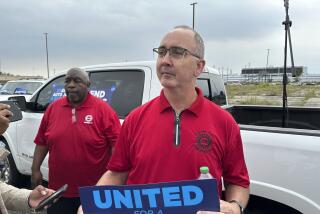Fact check: Obama, Romney trade charges over federal auto bailout
- Share via
In a presidential debate over foreign policy, one of the most contentious exchanges between President Obama and Mitt Romney, surprisingly, was over Detroit.
“You know, if we had taken your advice, Gov. Romney, about our auto industry, we’d be buying cars from China instead of selling cars to China,” Obama said.
Obama was touting his role in the bailout of General Motors and Chrysler, which began under the Bush administration in late 2008.
In a New York Times opinion article in November 2008, Romney urged the government, as the headline said, to: “Let Detroit Go Bankrupt.”
“A managed bankruptcy may be the only path to the fundamental restructuring the industry needs,” Romney wrote. “The federal government should provide guarantees for post-bankruptcy financing and assure car buyers that their warranties are not at risk.”
PHOTOS: Memorable presidential debate moments
“In a managed bankruptcy, the federal government would propel newly competitive and viable automakers, rather than seal their fate with a bailout check,” he wrote.
A managed bankruptcy is quicker and less chaotic than a regular bankruptcy and allows a company to restructure its operations to make it stronger when it emerges from the process. The dispute comes down to whether a managed bankruptcy for General Motors and Chrysler would have been possible at the time without the government providing approximately $80 billion in financing to keep the companies running during the process.
Romney said Monday night he was not advocating allowing General Motors and Chrysler to go out of business.
“I was born in Detroit. My dad was head of a car company. I like American cars. And I would do nothing to hurt the U.S. auto industry,” he said. “My plan to get the industry on its feet when it was in real trouble was not to start writing checks. … I said they need -- these companies need to go through a managed bankruptcy, and in that process they can get government help and government guarantees, but they need to go through bankruptcy to get rid of excess cost and the debt burden that they’d built up.”
Obama accused Romney of trying to “airbrush history.”
“You were very clear that you would not provide government assistance to the U.S. auto companies even if they went through bankruptcy,” Obama said. “You said that they could get it in the private marketplace. That wasn’t true.”
The bipartisan Congressional Oversight Panel, the government-appointed watchdog for the $700-billion Troubled Asset Relief Program, backs Obama on this. It said in a January 2011 report that private financing was not available for General Motors and Chrysler in late 2008.
The panel said “the circumstances in the global credit markets in November and December 2008 were unlike any the financial markets had seen in decades. U.S. domestic credit markets were frozen in the wake of the Lehman bankruptcy, and international sources of funding were extremely limited.”
Steven Rattner, a former Wall Street executive who headed Obama’s auto task force, has been outspoken that private financing was not available for General Motors and Chrysler.
“In late 2008 and early 2009, when GM and Chrysler had exhausted their liquidity, every scrap of private capital had fled to the sidelines,” Rattner wrote in the New York Times in February.
INTERACTIVE: Battleground states map
“Without government financing — initiated by President George W. Bush in December 2008 — the two companies would not have been able to pursue Chapter 11 reorganization. Instead they would have been forced to cease production, close their doors and lay off virtually all workers once their coffers ran dry,” Rattner said.
During the Republican primaries in February, former GM Vice Chairman Bob Lutz said his company needed government money to survive. He told the Detroit Free Press that the bailouts were a “necessary government intervention.”
“The banks were even more broke than we were,” Lutz said of the nation’s financial condition in late 2008. “Who had the money?”
Follow Politics Now on Twitter and Facebook
Twitter: @JimPuzzanghera
More to Read
Get the L.A. Times Politics newsletter
Deeply reported insights into legislation, politics and policy from Sacramento, Washington and beyond. In your inbox three times per week.
You may occasionally receive promotional content from the Los Angeles Times.











